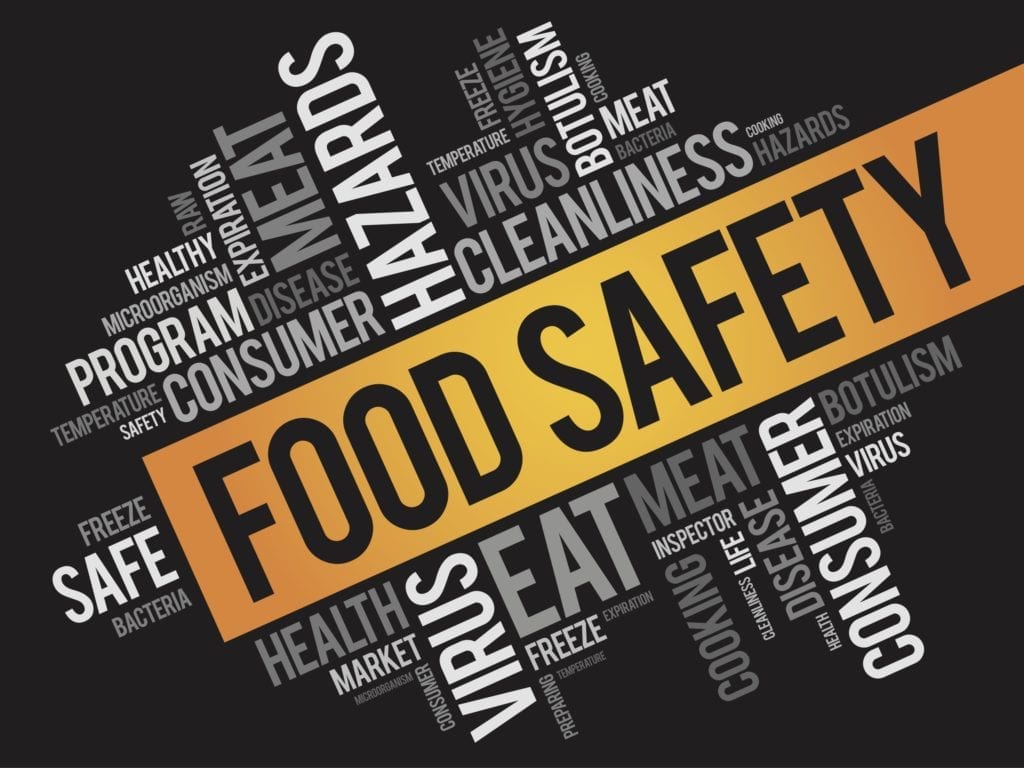Brian J Graber LLC is a food safety whistleblower lawyer representing Illinois, Indiana, and Michigan employees retaliated against for reporting food safety violations. In Illinois, employees retaliated against for reporting food safety violations have protections under Illinois and federal whistleblower laws. In Indiana and Michigan, employees have protections under the FDA Food Safety Modernization Act’s Whistleblower Protections.

FDA Food Safety Modernization Act’s Whistleblower Protections
The FDA Food Safety Modernization Act’s Whistleblower Protections, (FSMA), is a federal law protecting Illinois, Indiana, and Michigan employees from retaliation for making complaints about food safety or other violations of the Federal Food, Drug, and Cosmetic Act, (FD&C Act).
Under the FSMA, 21 U.S.C. 399d(a), no entity engaged in the manufacture, processing, packaging, transporting, distribution, reception, holding, or importation of food may discharge or discriminate against any employee with respect to compensation, terms, conditions, or privileges of employment because that employee engaged in certain statutorily protected activities. The U.S. Department of Labor/OSHA investigates violations of the FSMA Whistleblower Protections.
What Employers Are Covered By The FSMA Whistleblower Act?
The FSMA applies to any “entity” engaged in the manufacture, processing, packing, transporting, distribution, reception, holding, or importation of food. The FSMA does not define the terms “manufacture, processing, packing, transporting, distribution, reception, holding, or importation. OSHA relies on the Food and Drug Administration’s definitions in interpreting these terms in administering the FSMA Whistleblower Protections.

Covered employers for the purposes of the FSMA’s Whistleblower Protections, 21 U.S.C. 399d, include many businesses that deal with food at every step of production and distribution, including shipping, storing, and cooking. OSHA has determined that grocery stores are covered employers for the purposes of the FSMA’s Whistleblower Protections.

OSHA has determined that restaurants are covered employers for the purposes of FSMA’s Whistleblower Protections. Other covered employers may include food holding facilities, warehouses, cold storage facilities, storage silos, grain elevators, and liquid storage tanks. OSHA has determined that food testing laboratories are covered employers.

OSHA has determined that the FSMA does not apply to an employer that is subject to the U.S. Department of Agriculture’s mandatory inspection authority if the employer does not also manufacture, process, pack, transport, distribute, receive, hold or import food that is regulated by the Food and Drug Administration.
FSMA Protected Activity
An employee is protected from retaliation under the FSMA, 21 U.S.C. 399d(a) if the employee engages in any of the following protected activities:
- Provided, caused to be provided, or is about to provide or cause to be provided to the employer, the Federal Government, or the attorney general of a State information relating to any violation of, or any act or omission the employee reasonably believes to be a violation of any provisions of 21 U.S.C. 301, et seq., or any order, rule, regulation, standard, or ban under 21 U.S.C. 301, et seq.;
- Testified or is about to testify in a proceeding concerning such violation;
- Assisted or participated or is about to assist or participate in such a proceeding; or
- Objected to, or refused to participate in, any activity, policy, practice, or assigned task that the employee reasonably believed to be in violation of any provision of 21 U.S.C. 301 et seq., or any order, rule, regulation, standard, or ban under this 21 U.S.C. 301 et seq.
Under FSMA, 21 U.S.C. 399d(a)(1), protected activity includes an employee’s report of information to his/her employer what he or she reasonably believes is a food safety or other violation of the Food, Drug and Cosmetic Act, 21 U.S.C. 301, et seq., (FD&C Act). FSMA, 21 U.S.C. 399d(a)(1), makes an employee’s report of information to either the Federal Government or The Illinois Attorney General about food safety or other violations of the FD&C Act protected activity.
FSMA, 21 U.S.C. 399d(a)(4) makes it a protected activity for an employee to object to, or refuse to perform any assigned duty the employee reasonably believes is a food safety or other violation of the FD&C Act.
Employee’s Burden of Proof of FSMA Whistleblower Claim
Under 29 C.F.R. 1987.104(e)(2) an employee must prove the following elements to establish a prima facie case for relief under the FSMA Whistleblower provisions:
- He/she engaged in protected activity under the FSMA, 21 U.S.C. 399d(a)(1)-(4) as described above;
- The employer knew or suspected that the employee engaged in the protected activity as described above;
- The employee suffered an adverse action; and
- Evidence sufficiently raising the inference that the protected activity was a contributing factor in the adverse action.
The standard for causation under the FSMA Whistleblower provision, 21 U.S.C. 399d(b)(2)(C)(i), is a contributing factor. OSHA defines a “contributing factor” as a factor which, alone or with other factors, in any way affects the outcome of the decision to take adverse action against the employee.
Common Food Safety Violations of the Food, Drug and Cosmetic Act
Common food safety violations of the Food, Drug and Cosmetic Act, (FD&C Act), include “adulterated” food. Food is deemed “adulterated” food under the FD&C Act, 21 U.S.C. 342(a)(1) if it contains any of the following:
- The food contains any poisonous or deleterious substance which renders it injurious to health;
- The food consists in whole of in part of any filthy, putrid, or decomposed substances, or is otherwise unfit for food;
- The food has been prepared, packed or held under insanitary conditions whereby it may have become contaminated with filth, or whereby it may have been rendered injurious to health.
The FD&C, Section 342(a)(1) listed several other factors that would make food “adulterated” for the purposes of FSMA’s Whistleblower Provisions.

Food is considered “adulterated” if it is prepared, packed, or held in unsanitary conditions in which it may have become contaminated with filth or made harmful to health.

The existence of live or dead insects or rodents in and around food or ingredients used to prepare or cook food is another example of “adulterated” food. Failure of employees to wear appropriate PPE when preparing food may be another example.
The FD&C Act, 21 U.S.C. 343 prohibits misbranding of food. Food is misbranded if it contains false or misleading labeling or it it otherwise fails to comply with labeling requirements or regulations.
Reporting Violations of the FD&C Act to the Government
Violations of the FD&C Act can be reported to the U.S. Department of Food and Drug Administration at this link to engage in protected activity under 21 U.S.C. 399d(a)(1), which requires a report to the Federal Government.
Since the FSMA, 21 U.S.C. 399(a)(1) allows employees to engage in protected activity by reporting food safety violations to the “federal government,” problems with food safety can be reported to the U.S. Department of Agriculture by clicking this link.
Violations of the FD&C Act can be reported to the Illinois Attorney General’s Office to engage in protected activity under 21 U.S.C. 399d(a)(1). The link to the contact page of the Illinois Attorney General’s website is here.
Violations of the FD&C Act can be reported to the Indiana Attorney General’s Office to engage in protected activity under 21 U.S.C. 399(a)(1). The link to the Indiana Attorney General’s Office is here.
Violations of the FD&C Act can be reported to the Michigan Attorney General’s Office to engage in protected activity under 21 U.S.C. 399(a)(1). The link to the Michigan Attorney General’s Office is here.
Statute of Limitations for FMSA Whistleblower Protections
The FSMA, 21 U.S.C. 399d(b)(1) requires an employee who believes that he or she has been discharged or otherwise retaliated against by any person in violation of Section 399d(a) to file a complaint with the Secretary of Labor/OSHA not later than 180 days after the date the violation occurs or else all whistleblowing claims under the FSMA’s Whistleblower Protection provisions will be barred.
Brian J Graber LLC, a Food Safety Whistleblower lawyer drafts and files FSMA Whistleblower Complaints for clients who retain our legal services. You should retain an experienced Food Safety Whistleblower lawyer to draft and file your complaint under the FSMA Whistleblower Provisions with OSHA. However, you can always file your own complaint with the Secretary of Labor/OSHA at this link.
Even if you failed to timely file an FSMA Whistleblower Complaint with the Secretary of Labor/OSHA within the 180-day statute of limitations, it is worth your while to consult with Brian J Graber LLC, an experienced food safety whistleblower lawyer because you might have other claims for wrongful termination under the tort of retaliatory discharge and/or the Illinois Whistleblower Act which have a much longer statute of limitations.
OSHA 210 Day “Kick-Out” Provision
Once your FSMA Whistleblower Complaint has been timely filed with the Secretary of Labor, OSHA has 210 days to investigate and issue a final decision. Under the FSMA, 21 U.S.C. 399d(b)(4)(A) if OSHA has not issued a final decision within 210 days after the filing of the complaint, or within 90 days after the written determination, you may bring an action in the U.S. District Court and seek a jury trial on all issues.
Contact Brian J Graber LLC, a food safety whistleblower lawyer if you would like a free consultation on your rights under the FSMA’s Whistleblower Protections, wrongful discharge, and the Illinois Whistleblower Act in Illinois at (312) 291-4648 or the attached email forms. Contact Brian J Graber LLC a food safety whistleblower lawyer if you would like a free consultation on your rights under the FSMA’s Whistleblower Protections in Indiana at (219) 232-9011 or in Michigan at (269) 230-6054 or by the attached email forms.
Illinois Food Safety Whistleblower Claims
In addition to federal FSMA Whistleblower protections, Illinois food service employees have protections under Illinois common law retaliatory discharge for whistleblowing and the Illinois Whistleblower Act. The statute of limitations for Illinois food safety whistleblower claims is much longer than the FSMA’s Whistleblower Protections requiring a Whistleblower Complaint to be filed within 180 days of the alleged adverse action.
Illinois Retaliatory Discharge Claims
The Illinois Supreme Court has long recognized the common law tort of retaliatory discharge when an employer fires an employee for whistleblowing. Whistleblowing for the purposes of the tort of retaliatory discharge can take two forms:
- Internally reporting to the employer a violation of a law protecting the health or safety of the public or a criminal law; or
- Externally reporting a violation of a law protecting the health or safety of the public or a criminal to a governmental or law enforcement agency.
In Lanning v. Morris Mobile Meals, Inc., 308 Ill.App.3d 490-491 (3rd Dist. 1999) the appellate court recognized a food service employee claiming she was terminated in retaliation for reporting to her supervisor that co-worker’s were violating Illinois Public Health laws by leaving meals for customers in 95-degree heat for indefinite periods, properly alleged the tort of retaliatory discharge. The appellate court found:
Compliance with health codes, like compliance with criminal codes, is not a matter of private concern between an employer and an employee. Rather it is a public concern of the highest magnitude.
Lanning, 308 Ill.App.3d at 493.
In Carty v. Suter Co., 371 Ill.App.3d 784, 786 (2nd Dist. 2007), an employee claimed he was discharged for reporting to his plant manager the use of spoiled food products in salads and mislabeling of food products in violation of the FD&C Act, 21 U.S.C. 342 (adulterated food) and 343 (misbranded food). The appellate court held:
Failure to protect an employee who raises health concerns, even to his immediate supervisor, may stifle the willingness of other employees to complain of similar problems. To protect the public, this result must be avoided. In order to protect the public from dangers associated with the use of spoiled food products and mislabeling of food products, employees of manufacturers of food products must be able to freely report their concerns, as the plaintiff attempted to do.
Carty, 371 Ill. App.3d at 789.
Illinois recognizes the common law tort of retaliatory discharge where a food service employee refuses an employer’s demand or assigned task to engage in conduct that would violate public health or criminal laws. Therefore, refusing to follow an employer’s directions to serve food to customers that are “adulterated” within the meaning of the FD&C Act, 21 U.S.C. 342(a) would be protected activity.
If you believe that you were wrongfully discharged from your food service position in retaliation for whistleblowing, contact Brian J Graber LLC, a Chicago food safety whistleblower lawyer at (312) 291-4648 for a free consultation or send an email to schedule a free consultation.
Food Safety – Illinois Whistleblower Act
The Illinois Whistleblower Act is broader than the tort of retaliatory discharge because the Illinois Whistleblower Act covers adverse action taken by an employer against an employee in retaliation for whistleblowing that is less than a termination.
The Illinois Whistleblower Act imposes liability on any employer who retaliates against a food service employee for engaging in any of the following activities:
- Disclosing information in court or an administrative hearing or in any proceeding, where the employee has a reasonable belief the information discloses a violation of a State or federal law, rule, or regulation;
- Disclosing information to a government or law enforcement agency, where the employee has a reasonable belief that the information discloses a violation of a State or federal law, rule, or regulation; or
- Refuses to participate in an activity that would result in a violation of a State or federal law, rule, or regulation.
Local Health Departments
Illinois adopted the FDA Food Code in June of 2016, which is used to regulate the retail food industry. Retail food establishments in Illinois, such as restaurants, bakeries, and grocery stores, fall under the jurisdiction of certified local health departments serving the jurisdiction where the establishment is located. Here is a link to the Illinois Department of Public Health website with a clickable map identifying the local health departments where food service employees may file food safety complaints for protection under the Illinois Whistleblower Act and the tort of retaliatory discharge.
- Cook County Public Health regulates food safety in suburban Cook County (excluding Oak Park, Stickney Township, Evanston, and Skokie). The link to Cook County Public Health’s food safety complaint page is here.
- The Chicago Public Health is the agency where food service workers can file a food safety complaint. Here is the link to the Chicago Public Health’s website for filing complaints.
- The Will County Health Department regulates food safety in Will County. Here is the link to the Will County Health Department for filing food safety complaints.
If you believe you were retaliated against in violation of the Illinois Whistleblower Act or discharged in violation of the tort of retaliatory discharge, contact Brian J Graber LLC, a food safety whistleblower lawyer for a free consultation in Illinois at (312) 291-4648 or Indiana at (219) 232-9011 or Michigan at (269) 230-6054 or send an email to schedule a free consultation.
